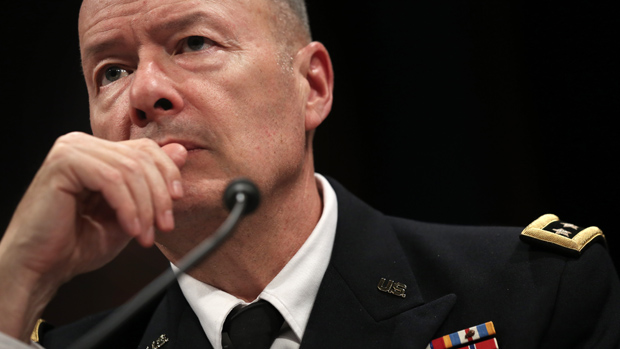Europeans gave us phone data NSA director tells Congress
US spy agency begins Snowden fight back insisting press 'don't understand' leaked documents

A free daily email with the biggest news stories of the day – and the best features from TheWeek.com
You are now subscribed
Your newsletter sign-up was successful
REPORTS that the National Security Agency (NSA) monitored the phone calls of thousands of people in Europe are "completely false", the agency's director has said.
Launching what the Daily Telegraph calls a "push back" against weeks of hostile press reports, General Keith Alexander told the House intelligence committee that documents leaked by Edward Snowden have been misinterpreted and misrepresented.
"To be perfectly clear, this is not information that we collected on European citizens," Alexander said. The reporting "that led people to believe that the NSA or United States collected that information is false, and it's false that it was collected on European citizens", he insisted. "It was neither."
The Week
Escape your echo chamber. Get the facts behind the news, plus analysis from multiple perspectives.

Sign up for The Week's Free Newsletters
From our morning news briefing to a weekly Good News Newsletter, get the best of The Week delivered directly to your inbox.
From our morning news briefing to a weekly Good News Newsletter, get the best of The Week delivered directly to your inbox.
Alexander claimed that much of the data was in fact collected by European spy agencies who were monitoring their citizens in countries outside of Europe. That data was later shared with the NSA.
Continuing his "aggressive rebuttal" of claims made in several European newspapers including France's Le Monde and Spain's El Mundo, the NSA director said documents leaked by whistleblower Edward Snowden has been misinterpreted by journalists. "They and the person who stole the classified data [Snowden] do not understand what they were looking at," he said.
Alexander's message was underlined in a briefing given to journalists at the Wall Street Journal by senior US officials. The paper says that the "millions of phone records at the centre of a firestorm in Europe" were supplied to the US by European spy agencies.
The revelations suggest "a greater level of European involvement in global surveillance, in conjunction at times with the NSA", says the WSJ. The disclosures also put European leaders such as Angela Merkel who "loudly protested reports of the NSA's spying in a difficult spot, showing how their spy agencies aided the Americans".
A free daily email with the biggest news stories of the day – and the best features from TheWeek.com
James Lewis, a former State Department official told the paper: "That the evil NSA and the wicked US were the only ones engaged in this gross violation of international norms - that was the fairy tale. It was never true. The US's behaviour wasn't outside the norm. It is the norm."
Alexander told the House intelligence committee that lawmakers should be careful they did not compromise US intelligence operations by overly restricting surveillance. But The Guardian says the White House has indicated that it would support at "least some of the congressional efforts to rein in the controversial surveillance practices of the NSA".
An internal government review in the wake of Snowden revelations has already led to changes in US intelligence-gathering activities – "thought to be a ban on eavesdropping on the leaders of friendly governments and a curb on surveillance at the United Nations".
-
 What to know before filing your own taxes for the first time
What to know before filing your own taxes for the first timethe explainer Tackle this financial milestone with confidence
-
 The biggest box office flops of the 21st century
The biggest box office flops of the 21st centuryin depth Unnecessary remakes and turgid, expensive CGI-fests highlight this list of these most notorious box-office losers
-
 The 10 most infamous abductions in modern history
The 10 most infamous abductions in modern historyin depth The taking of Savannah Guthrie’s mother, Nancy, is the latest in a long string of high-profile kidnappings
-
 Epstein files topple law CEO, roil UK government
Epstein files topple law CEO, roil UK governmentSpeed Read Peter Mandelson, Britain’s former ambassador to the US, is caught up in the scandal
-
 Iran and US prepare to meet after skirmishes
Iran and US prepare to meet after skirmishesSpeed Read The incident comes amid heightened tensions in the Middle East
-
 Israel retrieves final hostage’s body from Gaza
Israel retrieves final hostage’s body from GazaSpeed Read The 24-year-old police officer was killed during the initial Hamas attack
-
 China’s Xi targets top general in growing purge
China’s Xi targets top general in growing purgeSpeed Read Zhang Youxia is being investigated over ‘grave violations’ of the law
-
 Panama and Canada are negotiating over a crucial copper mine
Panama and Canada are negotiating over a crucial copper mineIn the Spotlight Panama is set to make a final decision on the mine this summer
-
 Why Greenland’s natural resources are nearly impossible to mine
Why Greenland’s natural resources are nearly impossible to mineThe Explainer The country’s natural landscape makes the task extremely difficult
-
 Iran cuts internet as protests escalate
Iran cuts internet as protests escalateSpeed Reada Government buildings across the country have been set on fire
-
 US nabs ‘shadow’ tanker claimed by Russia
US nabs ‘shadow’ tanker claimed by RussiaSpeed Read The ship was one of two vessels seized by the US military